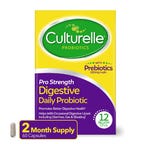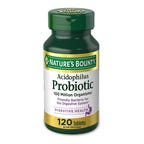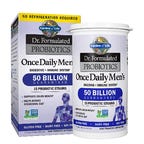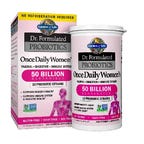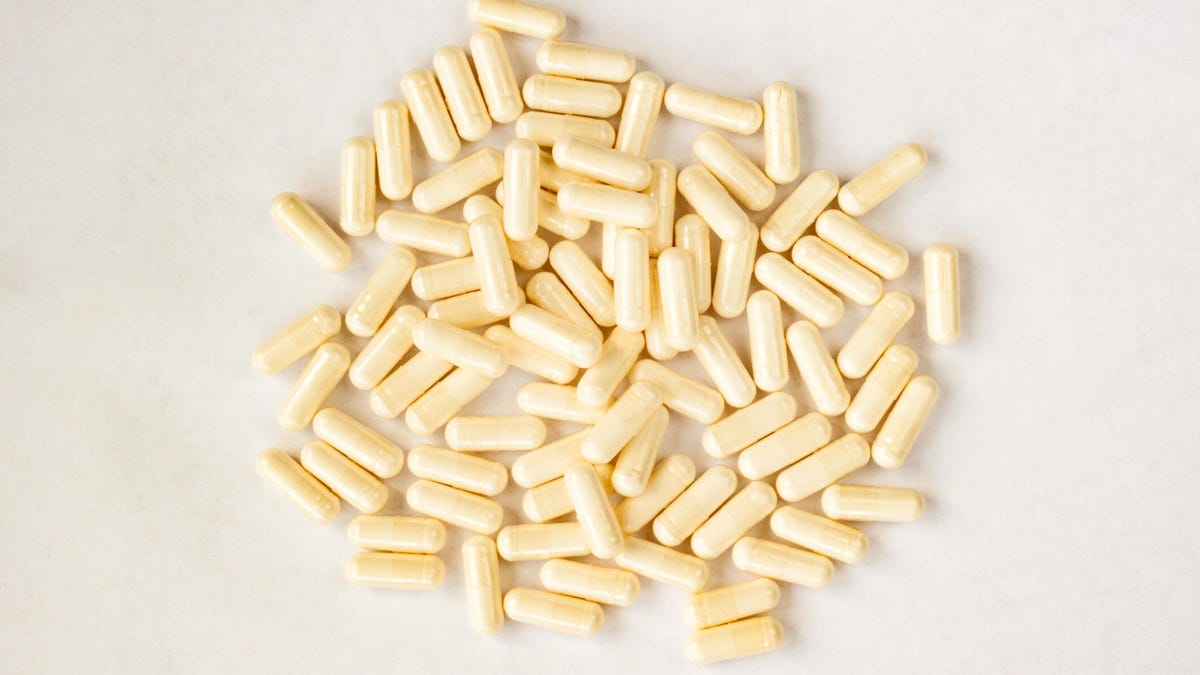
Probiotics are microorganisms found naturally in our bodies. When you take them in supplement form, the aim is to help these beneficial strains eliminate or balance out the bad, restoring a happy microbiome in the process. Probiotics can help with irritable bowel syndrome, or IBS, as well as gastrointestinal issues, eczema, yeast infections and lactose intolerance.
Not everyone needs a probiotic. If you’re already obtaining probiotics naturally in your diet and are not experiencing any gut health or other microbiome issues, chances are you don’t need a supplement. Among other foods, some of the best probiotics to eat for gut health include yogurt, kimchi, sourdough, certain cheeses, miso soup and pickled vegetables.
We reviewed a number of probiotics, along with their prices, ingredients and consumer reviews. Here are our picks for the best probiotics.
What is the best probiotic overall?
The best probiotic for you will first depend on your reasons for taking it. Someone who’s taking it for their gut health, for example, will likely require a different product than someone taking it for their vaginal health.
The best probiotic for you will also depend on your nutritional needs and dietary restrictions — are you vegan or allergic to any foods? Lastly, your doctor may have recommended a specific supplement to you based on your own health or lifestyle factors.
Best probiotic supplements of 2024
Culturelle probiotics are for anyone over 12 years old looking to boost their gut health. The capsules contain one of the most researched strains of bacteria — Lactobacillus rhamnosus — to aid in healthy digestion and bacteria balance.
Culturelle probiotics are non-GMO, gluten-free, dairy-free, soy-free, sugar-free, vegetarian and vegan. Each package contains 60 capsules — two months worth of probiotics. It is important to note that these probiotics are not delayed-release, meaning that the capsules will be absorbed right away in the stomach and not in the small intestine.
It doesn’t specify whether you should take the capsule with a meal. Store these capsules in a cool, dry place away from direct sunlight.
Nature’s Bounty has been a popular contender in the vitamin and supplement market since 1971. Found in most grocery and consumer stores like Target and Walgreens, Nature’s Bounty is especially accessible and affordable. Its probiotic supplements contain a very popular strain of bacteria — Lactobacillus acidophilus, which has shown to help conditions such as bloating, cramps and eczema.
The tablets are free of artificial color, flavor, sweeteners, sugar, starch, milk, lactose, soy, gluten, fish and sodium. This probiotic is suitable for vegetarians.
One bottle contains 120 tablets. Take these probiotics daily with or without a meal.
Physician’s Choice probiotics is one of the more popular on this list. With almost 110,000 reviews on Amazon, it is one of Amazon’s best-selling probiotics. The capsules contain five probiotic strains and five prebiotic strains. In addition, the supplements are delayed-release and will be absorbed in the small intestine.
The probiotics contain non-GMO ingredients without any presence of soy, gluten, milk, egg, wheat, peanuts, shellfish or preservatives. The prebiotic blend is all organic, including 50 mg of Jerusalem artichoke root, 50 mg of acacia senegal and 50 mg of chicory root.
One bottle contains 60 capsules, enough for two months. It doesn’t specify whether or not you should take it with a meal.
Garden of Life offers a probiotic formulated for men’s digestive and immune systems. With an impressive 15 strains, the capsules are also non-GMO, gluten-free, dairy-free, soy-free and vegetarian.
The Once Daily Men’s supplements are designed to aid in colon health and reduce bloating, cramping and gas. In addition to the probiotic cultures, each capsule contains 407 mg of a prebiotic fiber blend, including organic potato and organic acacia fiber.
One bottle contains 30 capsules. Take these daily probiotics with or without a meal. Not suitable for children.
Garden of Life also offers a probiotic formulated for women’s digestion, immune system and vaginal health. With an impressive 16 strains (one more than the men’s), the capsules are non-GMO, gluten-free, dairy-free, soy-free and vegetarian.
These probiotics especially cater to vaginal health with the added Lactobacillus reuteri and Lactobacillus fermentum strains, both clinically studied for vaginal health. In addition to the probiotic strains, there is also an added prebiotic fiber blend. The 377 mg of added fiber include organic potato and organic acacia fiber.
One bottle contains 30 capsules. Take these daily probiotics with or without a meal. Not suitable for children.
TruBiotics contains two of the most popular and studied strains – Lactobacillus acidophilus and Bifidobacterium animalis — both used to help the digestive tract and improve the body’s fight against infections. The capsules do not contain gluten, soy or animal-based gelatin; however, they do contain dairy.
TruBiotics claim that their probiotics support up to 70% of your immune system found in your digestive tract. In addition to immune health, both strains have been found to help maintain healthy digestive balance.
One bottle contains 60 capsules. It doesn’t specify whether you should take it with a meal.
In order to maintain a healthy pH and a balanced vaginal flora, some women turn to probiotics. The two strains present in this probiotic — Lactobacillus acidophilus and Lactobacillus rhamnosus — have been shown to support this healthy balance for women.
These non-GMO probiotics do not contain milk, eggs, fish, shellfish, nuts, peanuts, wheat, soy, gluten, coloring or preservatives.
Florajen probiotics need to be refrigerated in order to maintain the right potency. If you buy these supplements online, they will be shipped to your door packed in styrofoam and an ice pack. Immediately transfer to a refrigerator.
One bottle contains 30 capsules. It doesn’t specify whether you should take it with a meal.
Probiotics are beneficial live bacteria and yeast found naturally in our bodies. These good strains of bacteria help eliminate the bad strains of bacteria and yeast in our bodies, restoring the correct balance. Some people turn to probiotic supplements to help maintain this healthy balance.
Depending on the strain and potency, each probiotic supplement is labeled with a colony-forming unit, determining the number of bacteria colonies. The higher the number, it is suggested, the higher the chance of the probiotic taking. However, this doesn’t necessarily improve its efficiency.
If you suspect you are experiencing gut issues, talk to your doctor or primary care physician before beginning any probiotic or supplement. Not all probiotics are created equal, and not all probiotics will work for you. It is important to find a product that caters to your unique needs.
What works well for one person may not be the right choice for another. Here are some important things to keep in mind while shopping around for a gut health supplement.
Purpose: The number one thing you’ll need to narrow down is whether a given product meets your probiotic needs. There are differences between probiotics marketed toward men and those marketed toward women, for example, because they contain different formulas and strains that will be more beneficial to one group than the other.
Dietary restrictions: If you have specific nutritional needs (you’re a vegan or you’re allergic to eggs, for example), you’ll want to check the product information of any probiotic to be sure it’s safe for you to consume.
Release time: Some of the probiotics release or activate in the stomach, while some are delayed-release and absorbed lower in the digestive tract. Depending on your individual needs, you may want to look for a delayed-release probiotic.
Strength or CFU count: Probiotic supplements are labeled with a colony-forming unit number, which determines the number of bacteria colonies. The higher the number, it is suggested, the higher the chance of the probiotic taking. However, this doesn’t necessarily improve its efficiency.
When researching products to include in this list, we looked for probiotics that include strains with some evidence supporting their use for gut health, or their use for other microbiome health. We also considered consumer reviews, price, accessibility, variety of probiotic strains and other ingredients.
The World Gastroenterology Organization has deemed it safe for healthy adults to take a daily probiotic. Always read the recommendations on the back of the bottle. Speak with your doctor or primary care physician before starting any probiotic or supplement.
The best time to take your probiotic depends on the strain. One study concluded that the Saccharomyces boulardii strain could be taken with or without a meal, but the Lactobacillus and Bifidobacterium strains survived best 30 minutes before a meal.
Most probiotics on this list contain both Lactobacillus and Bifidobacterium strains, so it is advised to take them 30 minutes before a meal. However, research is limited. Consult your probiotics’ manufacturer recommendations.

